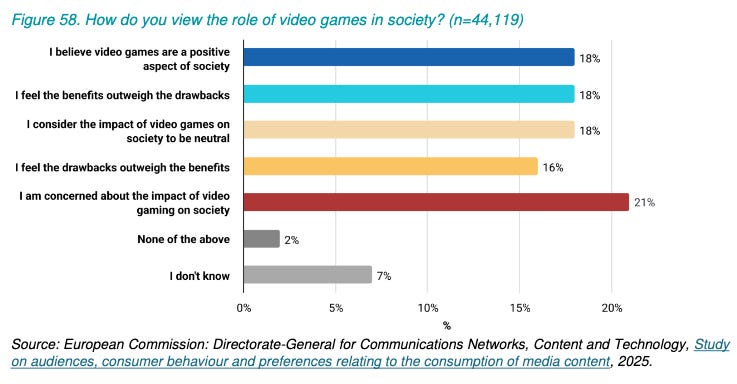More Europeans think the negatives of games outweigh the positives - Playing Politics
New report from European Commission also reveals that 14% of EU players want to support home-grown games
New EU report reveals the state of the European games biz (and some reputational headaches for the sector)
Ubisoft ties itself in knots over Saudi-backed Assassin’s Creed DLC
Australian Age Assurance deadline of 10th December looms in the Ones to Watch
Hello VGIM-ers,
Welcome to a brand new newsletter for VGIM Insiders: Playing Politics.
Replacing Ask George, but still penned by me, every month by me, Playing Politics offers readers:
An in-depth look at a story shaping the policy landscape around the video games industry.
A handful of must-know news stories from the intersection of games and politics.
Key political, legal, and policy developments to watch in the weeks and months ahead.
If you’d like to read Playing Politics, you need to sign up as a VGIM Insider for £6 per month or £50 per year.
Hit the link below to read this piece, to get extra VGIM content, early access to events, and money off all tickets, newsletter sponsorships, and other offers made to the VGIM community.
And with that done, let’s get on with the first Playing Politics.
More Europeans think the negatives of games outweigh the positives
Burying the lede: Thursday 4th September. After months of waiting, it was finally ready. I walked over to my PC. I hovered excitedly over the download button. And before I knew it, it was in my hands: The European Media Industry Outlook report from the European Commission’s Directorate General for Communications Networks, Content, and Technology (DG-Connect).
Extensive examination: Ok, ok, so the release of a new paper from DG-Connect was never going to make as much of a splash as Hollow Knight: Silksong. But for policy watchers, the paper, which runs the rule over the audiovisual industries that employ 1.3m people across the EU, featured a remarkably chunky section about the video games industry that looked at everything from the size of the consumer games market, to the state of jobs in the sector, and even the tax incentives available across Europe.
Worth a read: For industry newbies, the paper is an invaluable read to understand how the whole games business works in Europe. But after flipping my way through it on a train steaming through the not-so-recently Brexited United Kingdom, it also shows the likely direction of video game policy in Europe: one that emphasises the importance of player and worker rights, as much as business growth.
Headline numbers
Keep reading with a 7-day free trial
Subscribe to Video Games Industry Memo to keep reading this post and get 7 days of free access to the full post archives.




